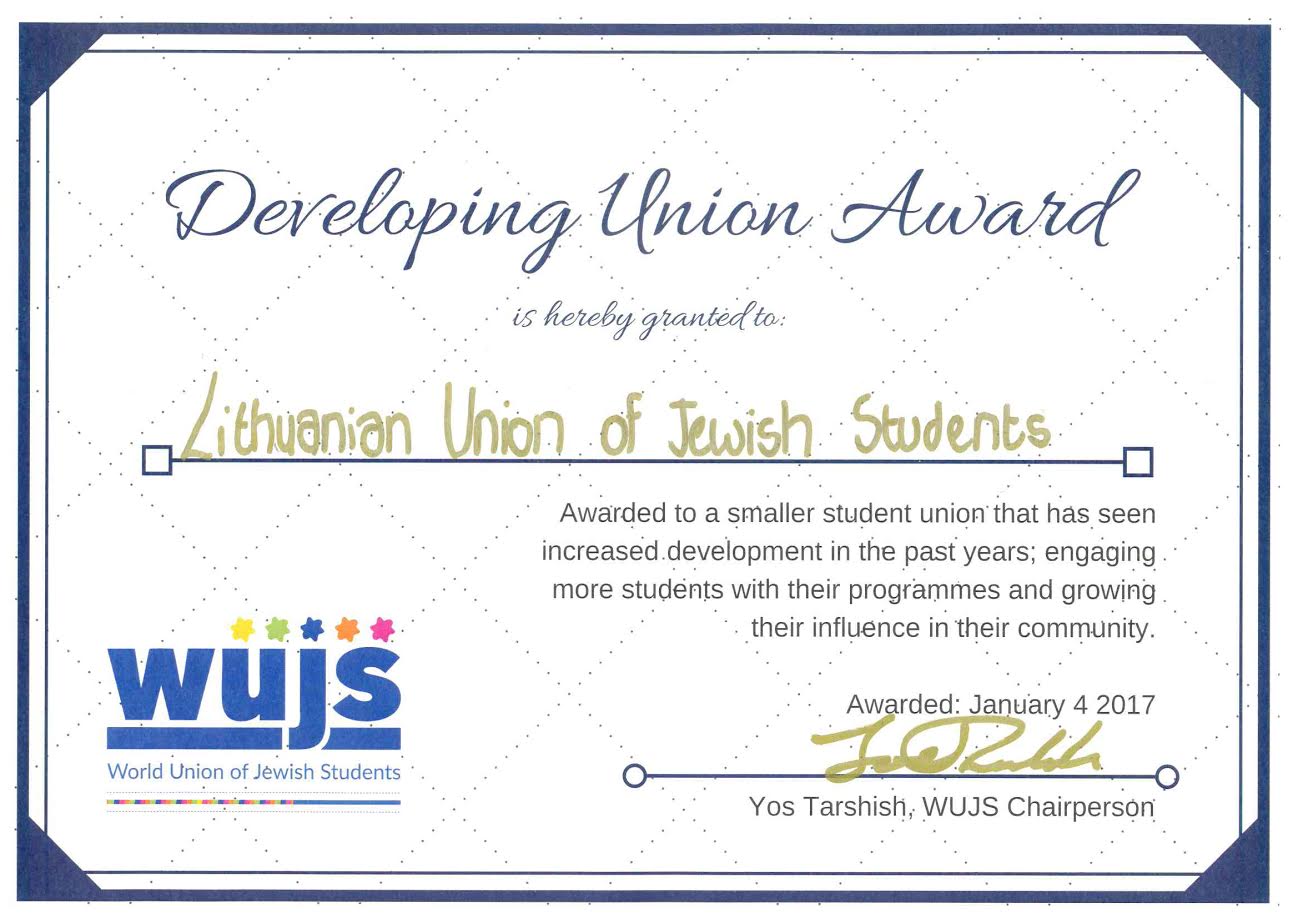
Lithuanian Women’s Magazine Features Amit Belaitė on Cover
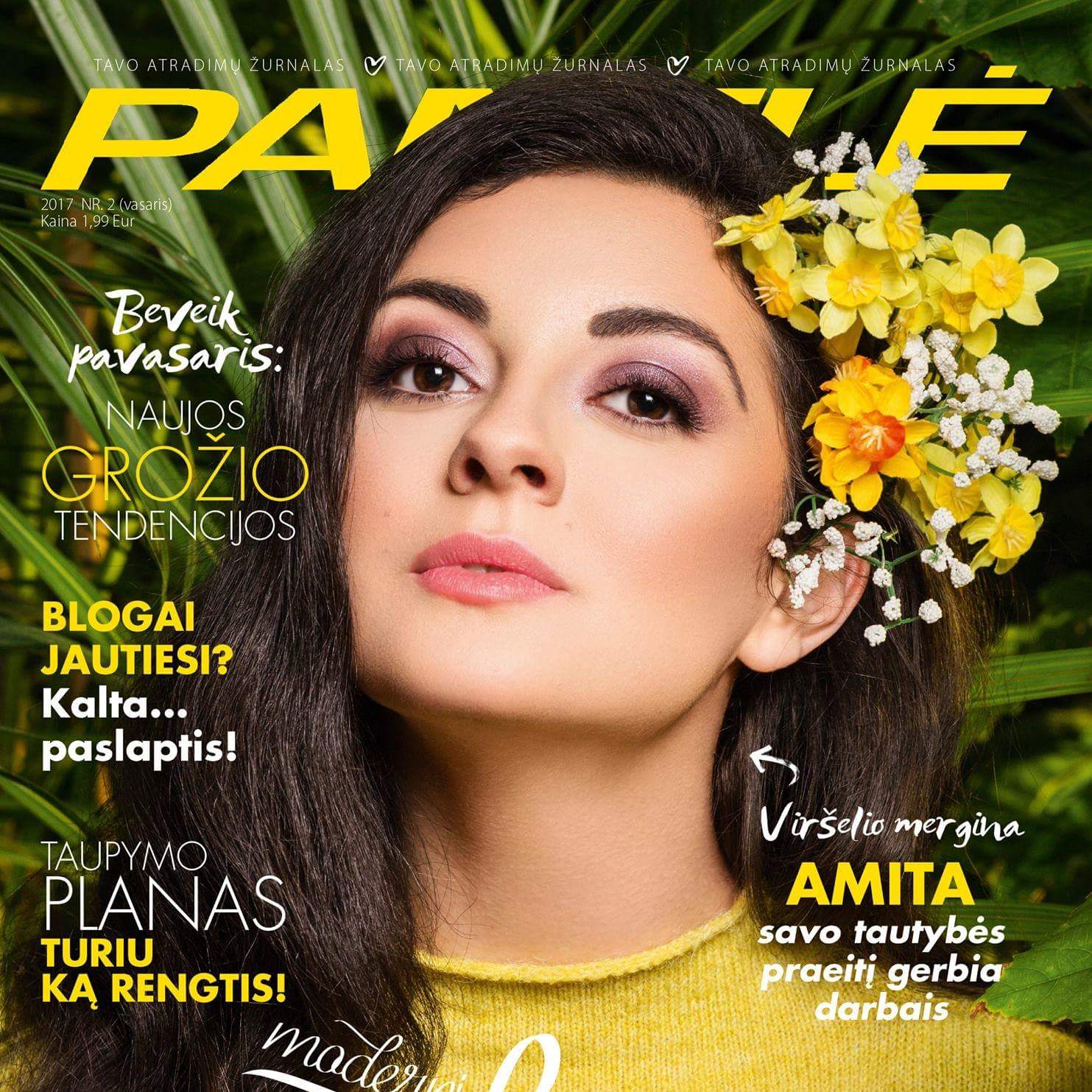 A popular magazine for young Lithuanian women has featured Amit Belaitė, the head of the Lithuanian Union of Jewish Students, on its February cover, with a long interview with her and a series of fashion photographs inside.
A popular magazine for young Lithuanian women has featured Amit Belaitė, the head of the Lithuanian Union of Jewish Students, on its February cover, with a long interview with her and a series of fashion photographs inside.
“Cover girl: Amita honors her people’s past with deeds,” the cover proclaims.
The feature on page 10 is called “Living History”:
“The Jewish girl Amita Belaitė (24) is completing her studies this year at Vilnius University. During her university career this active defender of human rights was able to establish the Lithuanian Union of Jewish Students, to become the vice president and a member of the executive board of the European Union of Jewish Students, to start a Jewish history project called Mayses fun der Lites/Stories from Lithuania, to become a Living Library volunteer and for all of those activities to receive a tolerance award. Amita, who selected social health studies as her major, said her professional career over those years would have been much more difficult if not for her love of her cherished boyfriend, the economist Rokas Grajauskas (31).”
More information in Lithuanian here.
Israeli Dance Seminar with Ilai Szpiezak
Ilai Szpiezak of London will give a seminar about dance for the first time in Lithuania. Registration is required.
The event is for both accomplished dancers and beginners who have just started or danced in childhood and now want to renew their skills.
To register, send an email to karina.semionova@gmail.com and please indicate the participant’s name, email and telephone number.
Registration is open till February 20.
Ilai Szpiezak, half-Israeli half-Argentinian, started his career as a dancer and choreographer of Israeli dance in 2006, rapidly moving into choreography and the direction of performing troupes and artistic organizations in Argentina at the age of 16. He danced in the international Israeli Dance Company Agshama performing in different countries around South America while training as a professional ballet dancer and was graduated from the Ulpan of Rikudei Am with honors in 2017. He moved to London in 2011 to take on the role of dance development manager in the Israeli dance community. Since then he has been responsible for directing, organizing and managing annual classes, workshops and concerts in London and around the UK including Machol Europa and many other events in Europe. He is looking forward to seeing you all soon!
Condolences
Howard Margol, 92, born in Jacksonville, Florida on February 22, 1924 to Morris and Sarah Margol, passed away on February 9, 2017. He was a veteran of World War II where he participated in the liberation of Dachau, a successful businessman and a devoted husband, father, grandfather and great-grandfather.

Howard’s roots were in Lithuania found a true passion in the field of genealogy, becoming one of the foremost authorities on Lithuanian genealogical research. For 20 years he led Roots Tours to Lithuania and helped thousands research their heritage. He served as president of LitvakSIG, initiated and headed the Internal Passports Project and served as chair of Records Acquisitions and Translations. Howard and his wife Esther founded the American Fund for Lithuanian and Latvian Jews to support elderly Jews in Lithuania and Latvia.
May his memory be blessed.
Lithuanian State Auditors Find Compensation for Jewish Property Used Appropriately

Vilnius, February 9, BNS–The Lithuanian State Auditor has no complaints on the use of compensation for Jewish religious communal property this year, although they found irregularities last year.
The State Auditor’s Office reported finding no violations in the 2016 audit of the use of such funds.
The year prior to that auditors said the foundation dispensing the funds had used some monies from the state allocated under the Lithuanian law on goodwill compensation for pre-Holocaust Jewish real estate had been used in the 2012-2015 period for matters not defined in the law, namely, to pay for administrative expnses of the disbursing foundation. In 2016 the Lithuanian parliament amended the law to allow for the Goodwill Foundation to pay its own administrative costs.
Some Features of the Jewish Calendar
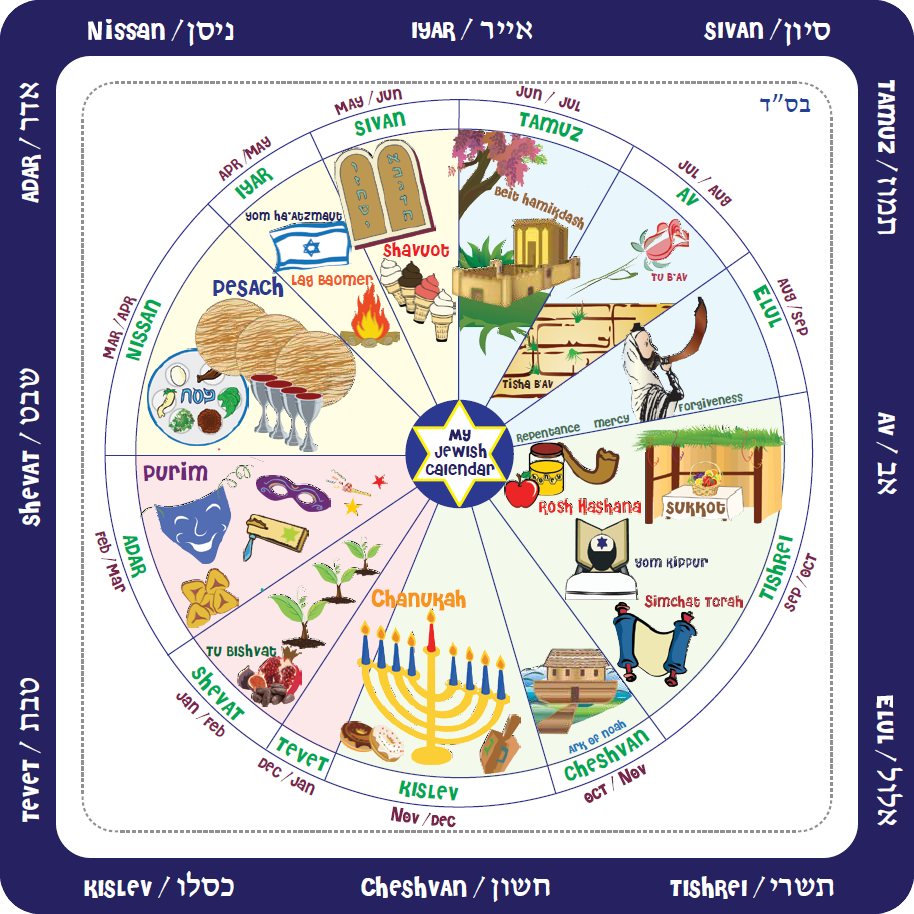

by Dr. Aušra Pažeraitė
The Mekhilta d’Rabbi Ishmael in the Midrash details a discussion by Talmudic sages regarding a line from the Bo portion of the readings for the last Sabbath (Exodus 12:2): “This month shall be for you…” Rabbi Ishmael says: Moses showed the new moon to Israel and said to them: In this way shall you see and fix the new moon for the generations. Rabbi Akiva says: This is one of the three things that were difficult for Moses to understand and all of which God pointed out to him with His finger. And thus you say: “And these are they which are unclean for you” (Leviticus 11:29). And thus: “And this is the work of the candelabrum” (Numbers 8:4). Some say it was also difficult for Moses to understand ritual slaughter, it being written: “Now this is that which thou shalt offer upon the altar; two lambs of the first year day by day continually.” (Exodus 29:38).
Modern scholar of Jewish philosophy David Boyarin says this midrash is one of many examples which plainly, almost spelling it out, show how St. Augustine was correct in saying Jews read Holy Scripture “erotically” [erotically charged by ocular desire]. But here “eros” doesn’t mean imprisonment to the material or carnal for its own sake. It is, rather, a certain method or way to understand the life of the spirit, the religious life, based on what is here and now, on the concrete physical world. Rav Moshe Rosenstein of Kelm (Kelmė) in his explanation of the way in which the wisdom of the world differ from the wisdom of the Talmudic sages gave as an example a small bird which once flew through a window into a home and couldn’t not find the path to fly back out because by nature it sought the way on high, whereas in this case it only needed to look downward. In this way the worldly-wise can exalt their wisdom so much that that which is “low,” the simple truths which aid in finding the answers, may be hidden (Basics of Knowledge, I, 24).
Bagel Shop Tolerance Campaign
An Exhibit Leading to Love and Understanding between People and Nations
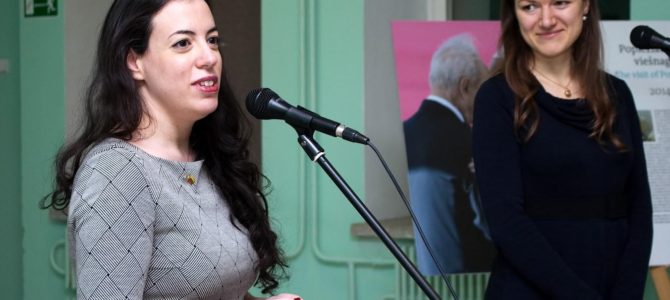
by Galina Romanova
On January 31 the cozy hall of the Nalšia Museum was packed to the gills for the ceremonial opening of an exhibit of interest to the whole world, and especially Catholics called “Pope Francis’s Visit to Israel.” Israeli embassy deputy chief of mission Efrat Hochstetler, Švenčionys regional administration head Rimantas Klipčius, regional administration council members, other public figures and locals from the town and region of Švenčionys attended the opening.
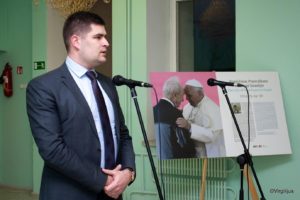
Israeli embassy press attaché Liana Jagniatinskytė recalled how the embassy came up with the idea of this exhibit and “released it into the wild,” sending the exhibit to small towns and larger cities throughout Lithuania.
Klipčius said he was glad friendship between Israel and the Švenčionys region keeps growing, thanking Israeli ambassador and frequent guest to the region Amir Maimon. The director of the regional administration spoke about the Pope’s trip to Israel and recalled Pope John Paul II’s visit to Lithuania just as the country broke free from the Soviet Union. He finished his optimistic speech with a nice gesture, presenting flowers and souvenirs to Hochstetler, who was in the region for the first time.
Condolences
Sara Kučkova, a member of the Vilnius Jewish Community, passed away February 6. She was born December 15, 1919. Our deepest condolences go to her relatives in this time of loss.
Fifth International Jascha Heifetz Violin Competition in Vilnius
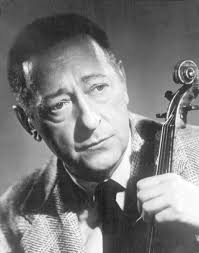
The fifth annual Jasche Heifetz violin contest will take place in Vilnius February 13-19, 2017. The Jascha Heifetz contest is one of the most significant musical competitions held in Vilnius celebrating the enduring legacy of the great Litvak violin virtuoso.
Although the 20th century produced so many excellent violinists, Heifetz stands out as the star of the highest magnitude within that constellation.
He was born in Vilnius in 1901 to a Jewish family. Vilnius was home to many nationalities, and Heifetz preserved the memory of his multicultural hometown and the life and musical traditions of his home. He began the climb to greatness in 1907 in Kaunas as a six-year-old prodigy. In 1912 he received European recognition for his talent in Berlin, and in America, beginning in 1917, he achieved world acclaim. Heifetz’s mastery has become the template for all modern violinists. The scholar Yuri Grigoryev believes the essential feature which set Heifetz apart from all others was actually the inspiration he took from the architecture of Old Vilnius, manifesting in architectonic grandiosity, classical sensibility and variety of expression.
Once George Bernard Shaw, won over by Heifetz’s performance, warned the artist in a letter the next day: “If you provoke a jealous God by playing with such superhuman perfection, you will die young. I earnestly advise you to play something badly every night before going to bed, instead of saying your prayers. No mortal should presume to play so faultlessly.” But God was kind to the artist. His art became part of the eternal repertoire of Grand Music and Vilna has the honor to be remembered as his birthplace.
Profesorius Jurgis Dvarionas
Full story in Lithuanian here.
European Youth Music Contest Winners Mark Jascha Heifetz’s 116th Birthday
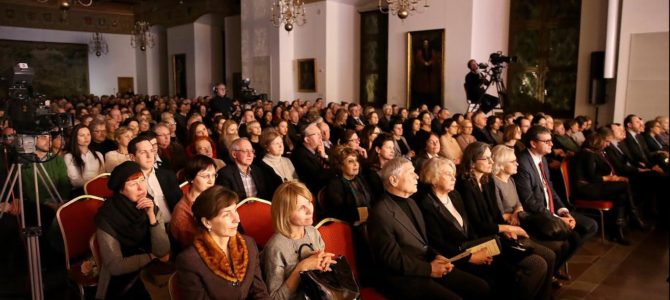
On the 116th birthday of violinist Jascha Heifetz on February 2 the winners of the European Youth Music Contest kicked off the Hommage à Heifetz project financed by the European Union program Creative Europe with a concert at the Royal Castle in Vilnius. Talented young musicians from Sweden, Japan, China and Lithuania held the first concert playing selections from Jascha Heifetz repertoire with the St. Christopher Chamber Orchestra of Vilnius conducted by Modestas Barkauskas.
Lithuanian Jewish Community chairwoman Faina Kukliansky gave a speech welcoming the audience and thank the organizers, partners, supporters and participants of the contest in the name of the community. On February 19 the winners will be presented a special prize from the Lithuanian Jewish Community.
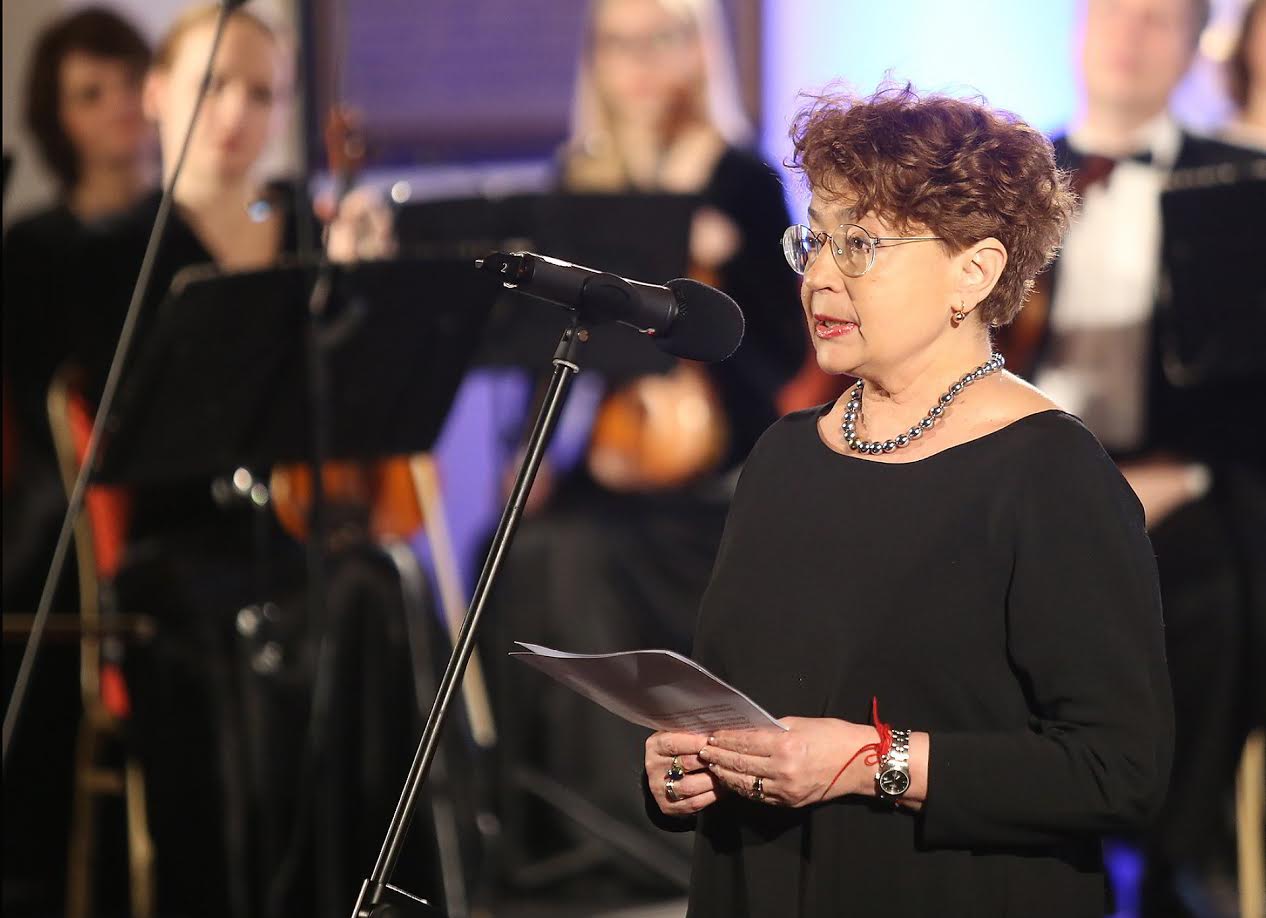
Lecture Series
Basia Nikiforova gives the lecture “Zygmunt Bauman: Life and Legacy” at 12 noon, Sunday, February 12 in the conference hall of the Lithuanian Jewish Community, Pylimo street no. 4, Vilnius.
Condolences
On February 3 Moisejus Fišmanas, a member of the Vilnius Jewish Community, passed away. He was born May 7, 1924. Our deepest condolences to his family and friends.
Lithuanian Jewish Community Birthdays in February

Vilnius Jewish Community:
Jelizaveta Rodionova (February 3)
Aleksandras Rutenbergas (February 7)
Viktor Chramcov (February 8)
Jefim Pesin (February 10)
Isaak Štargot (February 12)
Ravelis Kozlovas (February 14)
Šura Cechanovskaja (February 15)
Valerij Šulman (February 20)
Inesa Fainštein (February 21)
Valentina Ivanuškina (February 23)
Vladimir Savenkov (February 27)
Kaunas Jewish Community:
Feiga Tregerienė (February 17)
Maksimas Rudekas (February 19)
Klaipėda Jewish Community:
Michail Muruzov (February 15)
Igor Zamanskij (February 26)
Šiauliai Jewish Community:
Garold Vaisbrod (February 13)
Chaimas Šeras (February 24)
Raseiniai:
Antanas Kaplanas (February 22)
Nemenčinė:
Grigorijus Kušneris (February 2)
Jared Kushner, Trump Aide and Son-in-Law, Has Litvak Roots

Jared Kushner is the son-in-law and chief adviser to US president Donald Trump. His roots are in traditional Litvak lands, the areas where Jews lived in the mediaeval Grand Duchy of Lithuania. His grandmother Reichel Rae Berkowitz-Kushner hailed from Novogrudok, known in Lithuanian as Naugardukas, south of Grodno (Gardinas) in Belarus. She was imprisoned in the famous ghetto there where prisoners dug an escape tunnel and fled to the Jewish partisans in the forests.
Born on February 27, 1923, Rae Kushner was the second-oldest of four children in Novogrudok, then part of Poland and spelled Nowogródek.
The city had a thriving Jewish population, comprising just over half of the town’s 12,000 inhabitants. In the summer of 1941, the Nazis invaded Poland at the start of Operation Barbarossa. Though rumors of mass killings had reached Novogrudok by that point, few Jews actually believed that the Germans would carry out such atrocities. Following several massacres, the remaining Jewish population was forced into a ghetto. Rae lived in the city’s courthouse with her family and nearly approximately 600 other Jews. Rae’s mother and older sister were killed in a subsequent massacre on May 7, 1943. Before long, Rae, her father and younger sister were among only 300 Jews left. These remaining Jews managed to dig and escape through a 600-foot tunnel during the nights, using special-made tools in the workshops and hiding the dirt in the walls of buildings. When completed, the 600-foot tunnel was only large enough for one person to crawl through. Upon emerging from it, the escapees were met with gunfire, darkness and disorientation. Consequently, only 170 survived out of the 250 that escaped. Rae’s brother was among the fallen, having lost his glasses during the crawl through the tunnel. Rae and her surviving family spent ten days hiding in the woods, eventually making their way to the home of an acquaintance. The woman fed them and allowed them to sleep in her stable with the cows for one week–a risk that carried the penalty of a violent death. Shortly thereafter, the Bielski partisans took in the escapees from Novogrudok–including Rae and her family.
Architect Leonidas Merkinas Has Died
Leonidas Merkinas passed away February 7. The Vilnius Jewish Community mourns the loss of their long-time member born February 27, 1948. We mourn his loss with his surviving family members, his wife Tatjana and his sons and daughter. Our deepest condolences.
A wake will be held for him tomorrow, February 8, from 11:00 A.M. to 2:15 P.M. at the funeral home on Olandų street in Vilnius. He will be buried at the Jewish cemetery.
Righteous Gentile Gražbylė Venclauskaitė Has Died
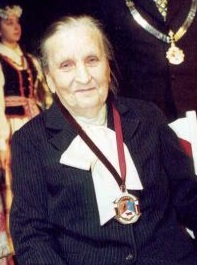
On February 1 at the age of 105 attorney and honorary citizen of the city of Šiauliai Gražbylė Venclauskaitė passed away. She was born in 1912 to a notable and special family, each member of which individually and as a family became part of history and inseparable components of the life and growth of Šiauliai and Lithuania. In deepest sorrow the Lithuanian Jewish Community mourns her loss. The Community had been preparing a greeting to her on her birthday, noting all the accomplishments of her and her family rescuing both Jews and Lithuanians. The State of Israel recognized Venclauskaitė’s bravery in saving Holocaust victims, bestowing the title of Righteous Gentile.
Venclauskaitė had become a symbol of the city of Šiauliai, embodying optimism and quick wit, and was a living legend. She will likely be buried next to her father Kazimieras Venclauskis, the first mayor of Šiauliai in independent Lithuania before World War II.
Lithuanian Holocaust Survivor Speaks at Lithuanian School
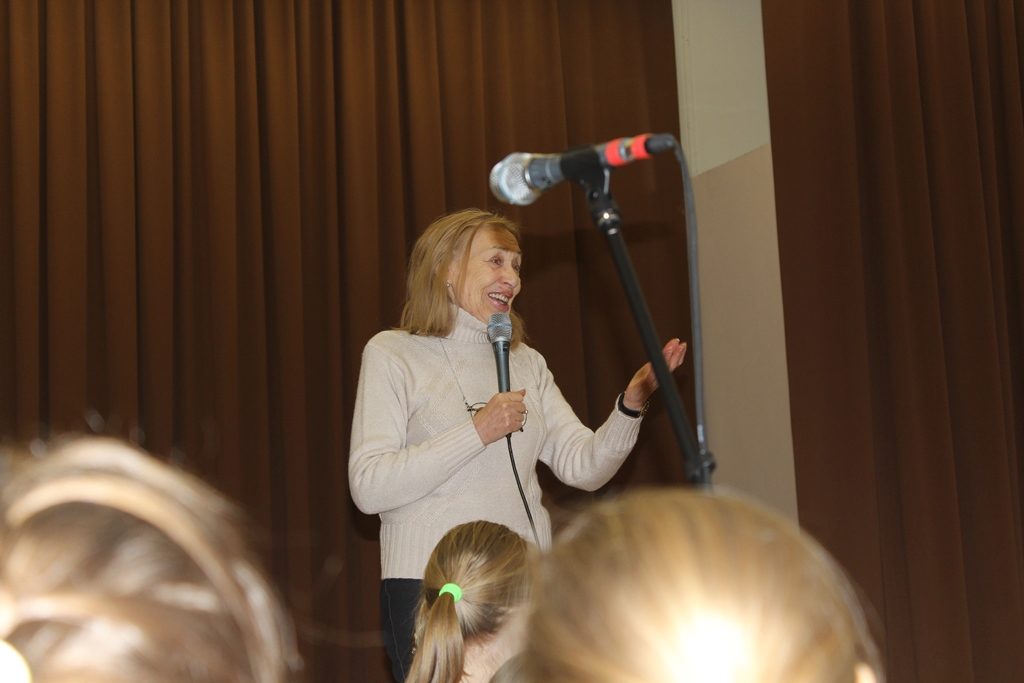
As part of the international project Face of Dialogue, Holocaust survivor Sulamita Lev spoke to 7th and 8th graders at the Pope John Paul II Pre-Gymnasium in Vilnius on January 24. She was accompanied by Lithuanian Jewish Community Executive Secretariat and Protocol Officer Monika Antanaitytė. The event began with a presentation by students of Lithuanian Jewish history, the performance of several songs and dancing to Hava Nagila.
Full story in Polish on the school website here.
Full story in Lithuanian on the school website here.
Letter from Šilalė Affirms Respect for Jewish Cemetery

The Lithuanian Jewish Community has received a letter following publication of an interview with the sole survivor of the Holocaust in Šilalė, Lithuania, Ruvin Zeligman, who spoke about the disrespect shown the memory of the 1,500 Jews murdered there and the lack of care shown the Jewish cemetery and mass murder site.
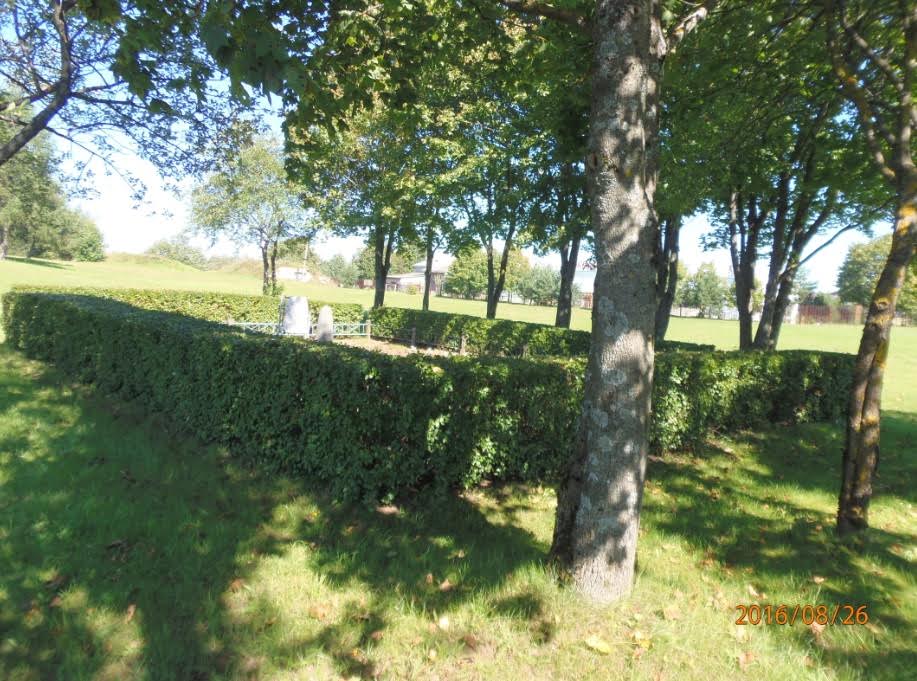
We received a letter from Jurgita Viršilienė, senior specialist of the Education, Culture and Sports Department of the Šilalė regional administration, and from the alderman of Šilalė, denying the facts about which Zeligman spoke.
Lithuanian Political Illusions: The “Policy” of the Lithuanian Provisional Government and the Beginning of the Holocaust in Lithuania in 1941
The Lithuanian Jewish Community is publishing a series of articles by the historian Algimantas Kasparavičius, a senior researcher at the Lithuanian History Institute.
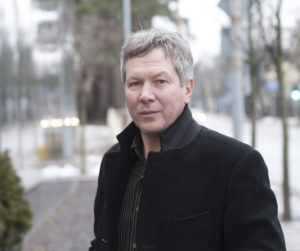
Part 4
By their June 25, 1941, meeting, the Provisional Government resolved to “move towards the organization of police in Kaunas, and expand partisan activities in the countryside where gangs of Bolsheviks, Communists and Jews still remain.” [1] On June 26 the PG sent a request to just-arrived Wehrmacht commandant von Pohl, asking: “1) to step-up even more the cleansing operation, 2) to allow our partisan units to operate more widely.” [2] At the same meeting that day acting prime minister professor Juozas Ambrazevičius stated “the partisans of Lithuanian work in contact with the Lithuanian Activist Front and the Provisional Government,” and where military action had already subsided “the operation of the partisans becomes police functions and as sharp-shooters.” [3] These weren’t empty words. The mechanism which had been wound up began to spin. For instance, the Alytus TDA platoon noted in their operations report for the beginning of July that “according to reports from citizens 36 Communists, 9 Red Army soldiers and a larger number of Jews had been apprehended and are in detention.” [4] It’s characteristic the Lithuanian official accurately listed the number of Communists and Red Army soldiers arrested without bothering to count the Jews arrested. If anyone knows at least a little bit about the propaganda content of the calls to action issued by the LAF and has an understanding of the internal logic and semantics of the Lithuanian language, I believe that person has a clear understanding of what that signifies and why the situation was described in this manner and not a different manner in the report by the Lithuanian official.
On July 17, 1941, Alytus district administrator Antanas Audronis reported to Provisional Government interior minister colonel Jonas Šlepetis: “The are carrying out arrests and conducting searches, and fulfilling quotas for Communists, robbers and rumor-mongers. The quotas are turned over to the local German military command. By German order 82 Communists have been shot in the district. There are 389 under arrest and approximately 345 more Communists need to be arrested.” [5] If this document isn’t a typical example of Nazi collaboration, then what does collaboration even mean?
On July 16, 1941, Alytus district police chief and aviation captain Stasys Stasys Krasnickas–Krosniūnas gave a speech to his subordinates: “Jewry, as an inbred people who under the red banner as a cover want to enslave all of humanity through the means of the highest kind of sadism and turn us into animals, has been very quickly dealt with through the radical measures of the führer of the German people. We must consider that this problem has already been solved, but there still appears one or another Lithuanian, even a police officer, who attempts to solve this problem in their own way. I tell you there can not be two different opinions on this problem. There is and should be only one opinion, it must be executed 100%, and it is clearly set out in Adolf Hitler’s book Mein Kampf.” [6]

